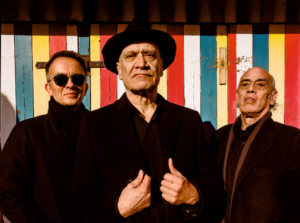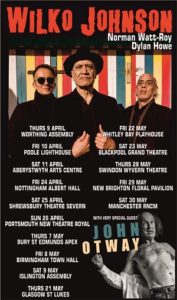Dave Woodhall talks to the very much living legend Wilko Johnson.
You never know where to start writing about Wilko Johnson. Dr Feelgood guitarist, solo star, influence on a couple of generations, Games of Thrones actor and the subject of several award-winning docuentaries. Then there’s the small matter of a battle with cancer that saw him given months to live before a ground-breaking nine-hour operation and a recovery aided by support from what seemed the entire country. So not knowing where to start, I asked for a bit of help.
It’s difficult to write anything new about you. You must get tired of having to talk about illness.
“Funnily enough, like most musicians I’m an egotist and I love talking about myself. When I was going through the illness people were writing to me and of course the press were interested but I didn’t get tired talking about it. I do talk about it a lot, but it’s a good topic.”

It is hard to pin you down, though. There was the massively influential Feelgoods, the enormous respect you’ve been held in by your peers for decades, actor, songwriter, the films, then you know what and your survival. Do you think that somewhere down the line the fact that you’re actually a musician sometimes gets lost?
“I don’t know. I don’t know if calling me a musician defines me, anyway. Like anybody else I’m liable to contract cancer. And I do have to say ‘Hello, I’m not just a cancer victim, I do play the guitar’. The fact that I’m a musician was completely by accident. I never set out to be a musician, I just did it for fun and that led to a series of events. It’s just what I did; when I was a hippy in Katmandu when I was twenty, if someone had said to me I was going to spend my life as a musician I’d have said that was never on the cards.”
It’s strange to think that while you were a hippy, all those thousands of miles away, round the corner from where you grew up there were a group of lads in their formative days who were going to come out and change the face of music.
“Everything about Dr Feelgood was that we were just people who were doing it, same as bands everywhere. How much we changed I don’t know. That’s for others to look at.”
As a child you were saved during the Great Flood of 1953. Do you think that had any influence on your life from then on?
“I was five at the time, just started school. My dad was a gas fitter and he was on call so we had a telephone which was rare then, and we got advance warning. Our mum got us all dressed and ready to go. Canvey Island was a desolate place, just flat fields and you could see the lights of the oil refineries in the distance. I remember standing at the back door of our bungalow and looking across the fields. There was this wave, the sea was coming over the field right at us. We were evacuated for a couple of weeks, a couple of the kids at school didn’t come back. 150 people lost their lives that night.”
The 2018 album Blow Your Mind was your first of original material for thirty years. How easy was it to come up with the material?
“We made the record at Rockfield studios in Monmouth and when we were driving there I was thinking that this was the first record I’d made for hundreds of years that had money and a record company behind it. There was a lot riding on it, I had two maybe three songs and I was thinking ‘Oh blimey’. We got there and I got working like crazy, writing the songs as we went along. It was enjoyable.”
Any writer, whatever the field, will tell you that there’s nothing like the feeling when the words start to flow.
“Exactly. Before that it’s proper panic, then suddenly it starts to happen. You don’t know how or why, it’s not as though you chant some mantra and the words arrive, they’re going to come when they’re going to come. It’s like making love – try too hard and you’ll knock yourself out. Just relax and wait for it to happen.”
It’s a really timeless album. It could have come out in 1974, or ’84, or any time.
“I suppose all of us come out of two generations. It was the kind of music that kicked off in the sixties with the likes of the Stones and that’s the basis of it.”
The track Marijuana could have been written by Robert Johnson, it has such an authentic feel.
“That was a funny one. I’d written it and never intended to use it. After I got my diagnosis I was sitting at home and I wanted to write this song about awaiting death. Then during the recording I was standing in the studio picking at it and Dave Erringa the producer wanted to know what it was. He demanded that we did it, and it came out real good.”

Maybe you had sold your soul to the devil for it.
“If I did I didn’t get much for it”.
So you’re having to hit the road again. Birmingham Town Hall – you must have played there before.
“Well, I can confidently answer yes, but do I remember it – no.”
And you’re touring with a few old buddies. Norman Watt Roy – he must have been with you a few years.
“Something like forty, back to when I was with the Blockheads. Back in the day, 1984 I think, everything was going wrong. The final insult came when my bass player left me to join Eddie & the Hot Rods. I was going to quit, I had three or four gigs left. I asked Norman to do them, he came in and we never stopped.”
You’ve also got John Otway on the bill. There’s another national treasure – maybe you could have a Celebrity National Treasure-Off.
“I first met John way back when. We’ve always been pals, share the same sense of humour and we’ve done a tour before where we ended up doing Born to Be Wild at the end. Some of the stuff he pulls on stage though, he’s seriously idiotic.”
And when the tour’s over what next – another album, TV, writing?
“I’ve never been one, and especially since the Big C, to plan things out. I just live my life and let things happen. I never intended to do this, things just happened.”
You were influenced by the legendary Mick Green, and in turn you’ve influenced many others. Who do you think is going to carry on from you?
“I don’t really know. I just play guitar. Fender did give me a signature Telecaster eventually, I think they’ve all sold out, but I don’t know who’s coming now. I’m no different to most old people, I can’t cope with anything new. My musical knowldge ends in about 1972. I could play Trivial Pursuits until then but ask me a question about pop music after that and I won’t know. Everyone’s like that – you discover your heroes and you might not want to go on.”
And plenty of people discovered, and keep on discovering, Wiiko Johnson.
Wilko Johnson plays Birmingham Town Hall on Friday 8th May as part of a UK tour. Tickets


